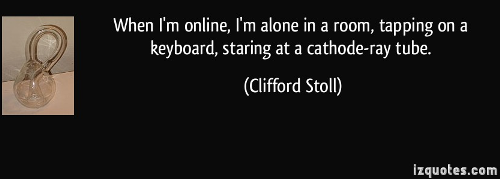A couple of years ago, Laura McLay had a post in her blog entitled “On Vampires and Stochastic Processes.” Nice bit of reflection on the statistical possibilities of vampires. What surprised her was the number of hits her blog had afterwards. It seems a good provocative title can draw in numbers of readers.
Soooo…be interesting to see if my hits increase (or maybe the NSA / FBI will just pay me a visit…). 🙂
But this post has nothing to do with the latest James Patterson or Jeffrey Deaver novel. It has everything to do with whether real learning is occurring in my online classes and the online classes of the faculty members with whom I consult, given that I have bought in to and used for years the concept (or “framework”) of Community of Inquiry.
Thanks to some research by our graduate fellow, we all read this week for our continuing conversations around the Community of Inquiry a 2003 article from Pawan and others entitled “Online Learning: Patterns of Engagement and Interaction Among In-Service Teachers”, as well as a 2013 article by Garrison and Akyol entitled “Toward the Development of a Metacognition Construct for Communities of Inquiry”. Even though one was 10 years old, I had not previously read either, so I found them interesting. I am continuing to question some of my basic assumptions regarding my own online teaching, which has always relied heavily on shared dialogue, first in discussion boards, and more recently in wiki-based discussions and blog posts and commenting.
Pawan’s article noted that without the explicit guidance and teaching presence of the instructor, students in the asynchronous discussions engaged primarily in “serial monologues” – presentations rather than conversations, with minimal effort to connect what they are saying with others. Jeff Nugent stated it eloquently when he said that after a decade of asynchronous discussions, the standard in most online classes was “monologues masquerading as dialogues.” The Pawan article looked at the interactions within the dialogue in three online classes, and found that discussions do not automatically become interactive and collaborative simply by virtue of being in a web-based 24/7 asynchronous medium. While they found some discussions to stay on task, many were often one-way serial monologues. Using the Practical Inquiry model, they found that online discussions were primarily focused in the first two phases of Trigger and Exploration, rarely rising to the levels associated with more critical thinking of Integration and Resolution. In fact, they found no resolution responses in any of the three courses they examined.
Last week, I asked if inquiry equaled learning, and the Practical Inquiry model would seem to suggest that resolution is the ultimate goal of learning. So, given my reliance on discourse and collaborative learning, would serial monologues and lack of resolution suggest that little learning occurred in my online classes?
I would like to think that I am a better “teacher” than that…
 In fact, I do routinely use the recommendations suggested by Pawan et al to structure online discussions and demonstrate overt instructor facilitation. I have not however routinely required my students to self-code their responses, as Pawan suggested. Interesting idea. Yet I fear that my reliance on dialogue has simply facilitated serial monologues in too many of my classes. Like the dinosaur to the left, I fondly remember some wonderful learning situations, but I also should admit that I have allowed many students to game me and game the system. They dutifully post the required post, “comment” to the required number of classmates, and move on to the next class without really digging deep into the learning that could occur.
In fact, I do routinely use the recommendations suggested by Pawan et al to structure online discussions and demonstrate overt instructor facilitation. I have not however routinely required my students to self-code their responses, as Pawan suggested. Interesting idea. Yet I fear that my reliance on dialogue has simply facilitated serial monologues in too many of my classes. Like the dinosaur to the left, I fondly remember some wonderful learning situations, but I also should admit that I have allowed many students to game me and game the system. They dutifully post the required post, “comment” to the required number of classmates, and move on to the next class without really digging deep into the learning that could occur.
And if I allow some of my students to “get away” with serial monologues, am I guilty of poor teaching?
Do we need to kill the serial monologues? Should I become a serial killer?
As I pondered this provocative thought, we continued our conversation today, circling back around to a more holistic view that learning in online classes comes from the whole and not just from a week to week discussion. Online courses have to have multiple methods for assessing student learning, with dialogue being simply one facet of the course. The second article by Garrison and Akyol actually had some interesting ideas around student self-assessment of their own knowledge of cognition, monitoring of cognition, and regulation of cognition. It has me thinking about ways I could have students in online courses do more to assess their own learning, to think more about their thinking.
Now the question becomes, where does resolution occur if not in the dialogue? Which led Jeff to raise the follow-on question – where is the RESEARCH about where resolution DOES occur in online classes?
That will be our starting point next week. If anyone has good suggestions on research (inside or outside the CoI body of work) that points to how students resolve inquiry, please share it!
{Graphics: izquotes, Larry Gonick}





The serial monologues struck me. I have taught in both traditional classrooms and online, and I have seen this phenomenon in both places. Although it is my impression that the online learning space represents a paradigm example of the serial monologue, its presence in all learning spaces is visible. I think the power of the concept is found in its pervasive nature, which sheds light on how humans think and interact. Although we are social beings, we each live in our own minds. Consequently, we filter through our own respective lenses. I can’t say that I have an answer, but I have sought to combat the problem of serial monologues without that explicit, and disturbingly powerful, idea.
One instructional method I have employed in every learning space I’ve had the pleasure to facilitate follows the spirit of the Rogerian Argument. Dynamically conceived, we acknowledge the contribution, we demonstrate our understanding of the stated idea/perspective/claim, we ask clarifying questions, then, and only then, we comment or critique. This line of thinking is also advocated in Adler and VanDoren’s book “How to Read a Book.” The act of reading critically is an act of engaging in a meaningful and exploratory dialogue with the author. I like to think of our class discussions as such.
The beauty of online learning, of written thoughts, is that our thinking, for better or worse, is exposed. In a very real sense, the act of writing is like an invitation for dialogue- for questions. In a learning space our posts, comments, expressions is a community act and challenging students to actively participate in a constructive and inquiry-based dialogue requires direction and guidance. I cannot assume that the topic is enough to stimulate curiosity and engagement. I cannot assume that talking students are intellectually engaged: enter into other perspectives before passing judgment, understand what another says prior to projecting one’s own perspective on the matter, seeking to exemplify a thought prior to criticizing it, posing questions that uncover assumptions, clarify conceptual meanings, and explore implications, and so forth. All I know is that my wife is a serial-killer because I tend to be a serial-talker.